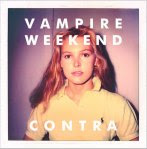
Vampire Weekend’s sophomore album “Contra” continues the band’s already considerable indie-pop reputation but doesn’t quite display much growth from the band. “Contra”, from independent label XL, debuted at number one on the Billboard 200 list, beating out Susan Boyle’s “I Dreamed a Dream” and Lady Gaga’s “The Fame”. This makes Vampire Weekend one of only 12 independent bands to achieve such an accomplishment.
Debuting in 2008 with their self-titled first album, the New York-based band has been the focus of both shining praise and venomous Internet criticism for their upbeat, melodious form of pop music. “Vampire Weekend” brought the band modest success in both the American and UK pop charts, and served to establish the band’s preppy, yet cynical and smart brand of rock. “Contra” maintains this style without actually surpassing it.
The first track, “Horchata,” begins with the same whimsical, melodic style that earned Vampire Weekend the ire of many bloggers and music critics when the band first came on to the national music scene. The band makes no concessions and soldiers on with their signature synth and African pop beats. Singer/songwriter Ezra Koenig has not abandoned his extensive, poetic vocabulary and continues to sew together an expressive tapestry of lyrics. “In December drinking Horchata/I’d look psychotic in a Balaclava. Winter’s cold is too much to handle/Pincher crabs that pinch at your sandals.”
The track “White Sky” opens with a happy synthesizer melody, which will inevitably cause a slight bobbing of the head in time to the music, as Koenig details a walk through Manhattan. The song is upbeat and catchy, but Koenig’s melodious falsetto can lean towards annoying at times.
One of flaws of “Contra” rests in the short length of the album. Clocking in at ten tracks and roughly 37 minutes long, fans of Vampire Weekend may feel cheated. Additionally, the album displays more of the band’s key talents in music, but it doesn’t do much to develop something new. Apart from the more radio-friendly track “Giving Up the Gun,” most of the album feels like safe territory for the band.
By Tyler Figg
Staff Reporter for the Purdue Exponent
Publication Date: 01/22/10